
Bethel is a town in Fairfield County, Connecticut, United States. Its population was 20,358 at the 2020 census. The town includes the Bethel Census Designated Place.

The Charles H. Norton House, also known as Sharpenhoe, is a historic house at 132 Redstone Hill in Plainville, Connecticut. Built in 1922, this brick Georgian Revival house was the home of inventor and machinist Charles Hotchkiss Norton (1851–1942), a Plainville native, from 1922 until his death. The house was designated a National Historic Landmark in 1976 for its association with Norton, who designed heavy-duty precision grinding machines important for development of the automobile industry.

The Main Street Historic District in Danbury, Connecticut, United States, is the oldest section of that city, at its geographical center. It has long been the city's commercial core and downtown. Its 132 buildings, 97 of which are considered contributing properties, include government buildings, churches, commercial establishments and residences, all in a variety of architectural styles from the late 18th century to the early 20th. It is the only major industrial downtown of its size in Connecticut not to have developed around either port facilities or a water power site.

The John Rider House is located on Main Street in Danbury, Connecticut, United States. It is a wooden frame house dating to the late 18th century.

The Octagon House is a historic octagon house at 21 Spring Street in Danbury, Connecticut, United States. It is considered the best octagon house of those that survive in Connecticut. In 1973 it was added to the National Register of Historic Places to avert its demolition in urban renewal.

Cannondale Historic District is a historic district in the Cannondale section in the north-central area of the town of Wilton, Connecticut. The district includes 58 contributing buildings, one other contributing structure, one contributing site, and 3 contributing objects, over a 202 acres (82 ha). About half of the buildings are along Danbury Road and most of the rest are close to the Cannondale train station .The district is significant because it embodies the distinctive architectural and cultural-landscape characteristics of a small commercial center as well as an agricultural community from the early national period through the early 20th century....The historic uses of the properties in the district include virtually the full array of human activity in this region—farming, residential, religious, educational, community groups, small-scale manufacturing, transportation, and even government. The close physical relationship among all these uses, as well as the informal character of the commercial enterprises before the rise of more aggressive techniques to attract consumers, capture some of the texture of life as lived by prior generations. The district is also significant for its collection of architecture and for its historic significance.
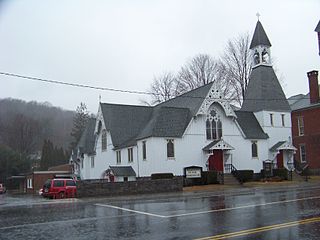
Trinity Church is a historic church at 160 Main Street in Thomaston, Connecticut. Built in two stages, 1871 and 1880, to a design by Richard M. Upjohn, it is a good example of Gothic and Stick Style architecture. The church was listed on the National Register of Historic Places in 1984. It is now part of a merged parish with St. Peter's of Plymouth.

South Danbury Christian Church is a historic church at 675 US 4 in Danbury, New Hampshire. Built in 1867, it is a little-altered and well-preserved example of a rural vernacular church. The building was listed on the National Register of Historic Places in 1985.

The Telephone Exchange Building is a historic building at 23 Union Street in downtown Norwich, Connecticut, behind Norwich Town Hall. Built in 1906-07, it was the first purpose-built telephone exchange building in the city, and is a little-altered example of period exchanges built by the Southern New England Telephone Company. The building now houses city offices. It was listed on the National Register of Historic Places on November 28, 1983.

The Taylor Memorial Library, also known as Taylor Library or Old Library, is a historic former library building at 5 Broad Street in Milford, Connecticut. Built in 1894, it is a Richardsonian Romanesque building designed by Joseph W. Northrop. It follows, but departs from, H. H. Richardson's design of the Crane Memorial Library in Massachusetts. The building was listed on the National Register of Historic Places in 1979. It now houses the offices of the Milford Chamber of Commerce.

New Milford station is a former railroad station on Railroad Street in New Milford, Connecticut. Built in 1886 by the Housatonic Railroad Company, it cemented the town's importance as a regional tourist and business center. It served passenger service until 1971, and is now home to the Greater New Milford chamber of commerce. It was listed on the National Register of Historic Places in 1984.

The Rev. John Ely House is a historic house at 54 Milwaukee Avenue in Bethel, Connecticut. Built in 1792, it is well-preserved example of period domestic architecture, and is further notable for a procession of owners important in the community's history. The house was listed on the National Register of Historic Places in 2001.
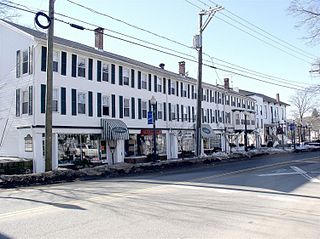
The Greenwood Avenue Historic District encompasses the historic commercial village center of Bethel, Connecticut. Extending along Greenwood Avenue from P.T. Barnum Square to Depot Place, the district includes a variety of commercial and residential architecture from the mid-19th to early 20th centuries. The district was listed on the National Register of Historic Places in 1999.

The Josiah Wilcox House is a historic house at 354 Riversville Road in Greenwich, Connecticut. Built in 1838, it is one of the town's finest examples of Greek Revival architecture. It was listed on the National Register of Historic Places in 1988.

The Charles Ives House, also known as Charles Ives Birthplace, is located on Mountainville Avenue in Danbury, Connecticut, United States. It is a wooden frame structure built in 1780 and expanded on since. Over the course of the 19th century it was the residence of several generations of Iveses, a family important in the city's history. In 1874 it was the birthplace of Charles Ives, who became an internationally recognized composer in the early 20th century.

The Sloan-Raymond-Fitch House is a historic house at 224 Danbury Road in Wilton, Connecticut. It is a 2+1⁄2-story wood-frame structure, five bays wide, with a side-gable roof and a large central chimney. A smaller two-story ell extends to the rear. The main block is evaluated to have been built sometime between 1760 and 1780, based on the construction methods used, while the ell is believed to be an older structure. The building has undergone some form of restorative work on several occasions, but has retained a significant amount of its original workmanship, and is a well-preserved 18th-century structure. The house has been moved from its original location. It is now on the same property as the Betts-Sturges-Blackmar House, and is part of a museum complex operated by the Wilton Historical Society.
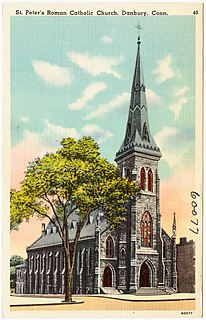
St. Peter is a Roman Catholic church in Danbury, Connecticut, part of the Diocese of Bridgeport. St. Peter's was the first Catholic church built in northern Fairfield County. It is the third oldest parish, and the fifth oldest Roman Catholic Church in the Diocese of Bridgeport. St. Peter's was originally a predominantly Irish congregation. Danbury's Annual St. Patrick's Day Parade steps off in front of St. Peter's. In more recent time, the parish has a significant number of parishioners of Latino and Brazilian heritage.
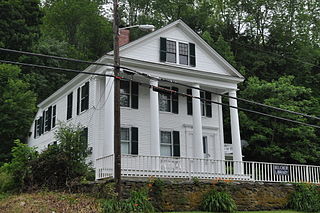
The Belcher Memorial Library is a small public library serving the village of Gaysville in Stockbridge, Vermont. It is located in the Daniel Gay House, an 1835 Greek Revival house built by Daniel Gay, a mill owner and namesake of the community. The building, one of the few to survive the 1927 flooding that destroyed most of the village, was listed on the National Register of Historic Places in 1978.

McIndoes Academy is a historic school building on Main Street in the McIndoe Falls village of Barnet, Vermont. Built in 1853, it is a prominent local example of Greek Revival architecture, serving as a local high school until 1969. It was listed on the National Register of Historic Places in 1975.
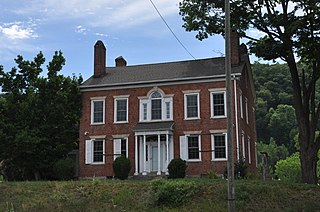
The John Glover Noble House is a historic house at 586 Danbury Road in New Milford, Connecticut. Built in the 1820s, it is fine local example of Federal period architecture executed in brick. It was listed on the National Register of Historic Places in 1977. It has most recently been used for commercial purposes, housing an antique shop.






















